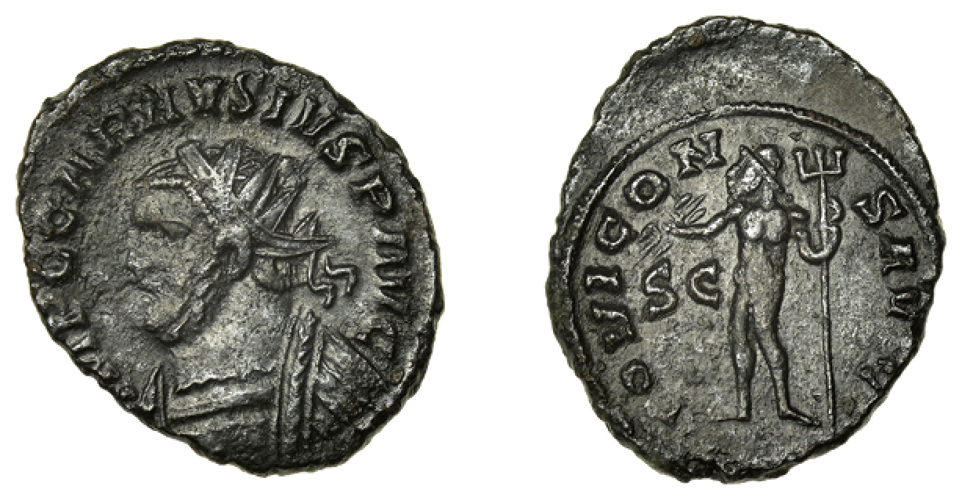Article


29 May 2020
An extremely rare coin was minted by the Emperor Carausius, the first ever Brexiteer, who rebelled against the Roman Empire and led a breakaway British Empire between 286-293 is to be offered by International coins, medals, banknotes and jewellery specialists Dix Noonan Webb in a live online auction of Ancient and Islamic Coins on Wednesday, June 3, 2020 at 11am on their website www.DNW.co.uk.
The bronze coin, known as an antoninianus, was struck by Carausius in 291 in order to pay his army. It was discovered by Kevin Scillitoe in Colchester and is one of only two known examples with this reverse. Kevin found the coin in the mid 1970s when he was just a 10 year-old boy (see photo above). At the time, the river in Colchester was being dredged and the resulting spoil heaps were deposited along the roads leading out of the town. These mounds attracted the attention of Colchester’s schoolchildren who sifted through the dirt using kitchen sieves in the hope of finding lost Roman treasures. Kevin found several Roman coins while searching which he has kept ever since and he only realised the importance of this coin when he saw the only other known example prominently exhibited in the British Museum.
As 57-year-old Kevin, who works in construction noted: “It was 1974-75, as it was a school day, and me and my older sister were dropped off for the day on a heap of dirt, put their by lorries not sure why but possibly to make verges along the Barrack Road in Colchester, there was about 20 people mainly youngsters going through the soil. In those days it was my job to dig the vegetable patch at home, and sieve for stones. So I took the sieve with me and I found about 3 coins, but this particular coin stuck out and seemed special, as it was so well preserved.”
He went on to say: “After finding the coin I saved up my pocket money until I had enough to purchase a metal detector and that is how I started my metal detecting adventure. Over the years I found and sold many coins, but I could never find a reference to this coin, and have never found a bronze Roman coin in such good condition. It wasn't until early this year that I read a report of a similar coin, that I believe was found in Lincolnshire and is in the British Museum at the moment.”
As Bradley Hopper, Coin Expert at Dix Noonan Webb explains: “The obverse of the coin shows a portrait of the rebel emperor Carausius facing left, while the reverse shows the god Jupiter. This god was considered by the Romans as the divine protector of both the Roman Empire and the emperor personally.”
He continues: “This depiction of Jupiter is interesting as the god is holding a trident, an item normally associated with the sea god Neptune. Images of Jupiter holding a trident are extremely rare, and this image which assimilates aspects of the two gods into a single figure appears to show that Carausius was claiming divine support from both Jupiter and Neptune. We know from other historical sources that in 290 Carausius successfully defended his British Empire from an invasion by the Roman Emperor Maximian, and the appearance of Neptune’s trident on this coin suggests that Carausius successful defence of his British Empire involved victory in an otherwise unrecorded sea battle.”
He finishes by saying: “We have estimated the coin to fetch £800-1,000 but we hope that it will sell for much more.”
Due to the current COVID 19 situation, there will be no physical viewing of the auction. Prospective bidders are encouraged to consult DNW’s website (www.dnw.co.uk) where all lots are illustrated and further condition reports can be requested if required. Customers are able to bid online (DNW make no additional charge for this service) or leave commission bids prior to the auction. Please note that the situation with regards to dispatch of lots is subject to constant review and should it be necessary lots can be securely stored without charge for as long as required. DNW are donating 5% of all buyers' premium during these uncertain times to the NHS Charities Together Covid-19 Appeal.
Share This Page